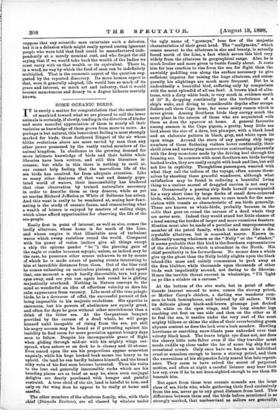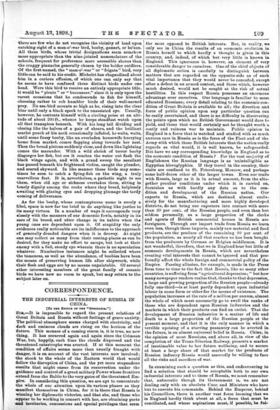SOME OCEANIC BIRDS.
IT is surely a matter for congratulation that the sentiment of mankind toward what we are pleased to call the lower animals is certainly, if slowly, tending in the direction of kinder and more merciful appreciation of them in nearly all their varieties as knowledge of them grows from more to more. As perhaps is but natural, this benevolent feeling is most strongly marked for birds, those feathered Zingari of the air whose blithe evolutions above are more envied by man than any other power possessed by the vastly varied members of the animal kingdom. In obedience to the growing demand for more intimate knowledge of birds and their habits whole libraries have been written, and still this literature in- creases ; but while in this there is nothing to cavil at, one cannot help feeling that the marvellous life of the sea birds has received far from adequate attention. Like so many other denizens of that vast and densely popu- lated world of waters, their inaccessibility has hindered that close observation by trained naturalists necessary in order to describe them as they deserve, while as yet no marine Richard Jefferies or White of Selborne has arisen. And this want is really to be wondered at, seeing how fasci- nating is the study of oceanic fauna, and remembering what a wealth of leisure is enjoyed by masters of sailing ships, which alone afford opportunities for observing the life of the sea-people.
Easily first in point of interest, as well as size, comes the lordly albatross, whose home is far south of the Line, and whose empire is that illimitable area of turbulent waves which sweep resistless round the world. Compared with his power of vision (sailors give all things except a ship the epicene gender " he "), the piercing gaze of the eagle or condor becomes myopic, unless, as indeed may be the case, he possesses other senses unknown to us by means of which he is made aware of passing events interesting to him at incredible distances from them. Out of the blue void he comes unhasting on motionless pinions, yet at such speed that, one moment a speck hardly discernible, turn but your eyes away, and ere you can again look round he is gliding majestically overhead. Nothing in Nature conveys to the mind so wonderful an idea of effortless velocity as does his calm appearance from vacancy. Like most of the true pelagic birds, he is a devourer of offal, the successful pursuit of fish being impossible to his majestic evolutions. His appetite is enormous,. but his powers of abstinence are equally great, and often for days he goes without other nourishment than a drink of the bitter sea. At the Gargantuan banquet provided by the carcass of a dead whale, he will gorge himself until incapable of rising from the sea, yet still his angry scream may be heard as if protesting against his inability to find room for more provision against hungry days soon to follow. Despite his incomparable grace of flight when gliding through mid-air with his mighty wings out- spread, when ashore or on deck he is clumsy and ill-at-ease. Even seated upon the sea his proportions appear somewhat ungainly, while his huge hooked beak seems too heavy to be upheld. On land he can hardly balance himself, and the broad silky webs of his feet soon become lacerated. Thus his visits to the lone and generally inaccessible rocks which are his breeding places are as brief as may be, since even conjugal delights are dearly purchased with hunger and painful restraint. A true child of the air, land is hateful to him, and only on the wing does he appear to be really at home and easefuL The other members of the albatross family, who, with their chief (Diomecla Exulans), are all classed by whalers under the ugly name of, " gooneys," bear few of the majestic characteristics of their great head. The " mallymoke," which comes nearest to the albatross in size and beauty, is actually found north of the Line, a fact which severs this bird very widely from the albatross in geographical range. Also, he is much livelier and more given to bustle fussily about. It costa him far less exertion to rise from the sea for flight than the unwieldy paddling run along the surface necessary to give sufficient impetus for raising the huge albatross, and conse- quently his alightings are much more frequent. But he is undoubtedly a beautiful bird, suffering only by comparison with the most splendid of all sea fowl. A brown kind of alba- tross, with a dirty white beak, is very much in evidence south of 20° S., dropping continually into the turbulence of a ship's wake, and diving to considerable depths after scraps. Sailors call them Cape hens, for some misty reason which is never given. Among Southern birds they occupy much the same place in the esteem of those who are acquainted with them as does the sparrow at home. A general favourite among seamen is the Cape pigeon, a pretty, busy little sea bird about the size of a dove, but plumper, with a black head and an elaborate pattern in black, grey, and white upon its open wings. Around the stern of any passing ship large numbers of these flattering visitors hover continually, their shrill cries and nnwearying mancenvres contrasting pleasantly with the deep monotone made by the driving keel through the foaming sea. In common with most Southern sea birds having hooked beaks, they are easily caught with hook and line, but will not live in captivity. Thoughtless passengers, wearied with what they call the tedium of the voyage, often amuse them- selves by shooting these graceful wanderers, although what satisfaction may be found in reducing a beautiful living thing to a useless morsel of draggled carrion is not easy to see. Occasionally a passing ship finds herself accompanied for a very short time by large flocks of small dove-coloured birds, which, however, do not seem to care much for the asso- ciation with vessels so characteristic of sea birds generally. These are known as whale-birds, probably because in the melee that goes on round the carcass of a dead whale they are never seen. Indeed they would stand but little chance of a meal among the hordes of larger and more voracious feasters. Mention must also be made of a peculiar and unprepossessing member of the petrel family, which looks more like a dis- reputable albatross, but is somewhat scarce. Known in- differently among whalemen as the "Nelly" or the " stinker," it seems probable that this bird is the Southern representative of the Arctic fulmar, which is abundant in the North. His chief peculiarity is his forwardness. No sooner does a whale give up the ghost than the Nelly boldly alights upon the black island-like mass and calmly commences to peck away at the firm blubber, while thousands upon thousands of other birds wait impatiently around, not daring to do likewise.
Hence the terrible threat current in whaleships, " 'light on ye like a stinker on a carcass."
At the bottom of the size scale, but in point of affec- tionate interest second to none, comes the stormy petrel, or Mother Carey's chicken, a darling wee wanderer com- mon to both hemispheres, and beloved by all sailors. With its delicate glossy black-and-brown plumage just flecked with white on the open wings, and its long slender legs reaching out first on one side and then on the other as if to feel the sea, it nestles under the very curl of the most mighty billows or skims the sides of their reverberating green abysses content as does the lark over a lush meadow. Howling hurricane or searching snow-blasts pass unheeded over that velvety black head. The brave bright eye dims not, nor does the cheery little note falter even if the tiny traveller must needs cuddle up close under the lee of some big ship for an occasional crumb. Only once have we known an individual cruel or senseless enough to harm a stormy petrel, and then the execrations of his shipmates fairly scared him into repent- ance. They seem to have solved the secret of perpetual motion, and often at night a careful listener may hear their low cry, even if he be not keen-sighted enough to see them flit beneath him.
But apart from these true oceanic nomads are the large class of sea birds who, while gathering their food exclusively from the sea, never go to any great distance from land. This difference between them and the birds before mentioned is so strongly marked, that unobservant as sailors are generally,
there are'few who do not recognise the vicinity of land upon catching sight of a man-o'-war bird, booby, gannet, or bo's'n. All these birds, whose trivial designations seem somehow more appropriate than the nine-jointed nomenclature of the schools, frequent for preference more accessible shores than the craggy pinnacles generally chosen by the bolder outfliers. Of the first-named, the " man-o'-war " or "frigate" bird, very little can be said to his credit. Michelet has rhapsodised about 'him in a carious effusion, of which one can only say that 'he seems to have confused three distinct birds under one head. Were this bird to receive an entirely appropriate title, it would be "pirate " or " buccaneer," since it is only upon the rarest occasions that he condescends to fish for himself, choosing rather to rob humbler birds of their well-earned prey. No sea-bird mounts so high as he, rising into the clear 'blue until only a black speck to the unassisted eye. Usually, however, he contents himself with a circling poise at an alti- tude of about 200 ft., whence he keeps steadfast watch upon all that transpires beneath. With his long tail dividing and 'closing like the halves of a pair of shears, and the brilliant scarlet pouch at his neck occasionally inflated, he waits, waits, 'until some fussy booby, like an overladen housewife hurrying 'home from market, comes flapping along towards her nest. Then the broad pinions suddenly close, and down like lightning tomes the marauder. With a wild shriek of terror booby disgorges her fish, but ere it reaches the water out flash the black wings again, and with a grand sweep the assailant has passed beneath his frightened victim, caught the plunder, and soared skyward. In like manner these birds may some- times be seen to catch a flying-fish on the wing, a truly marvellous feat. It is, nevertheless, a pathetic sight to see 'them, when old age or sickness overtakes them, sitting in 'lonely dignity among the rocks where they breed, helplessly .waiting with glazing eyes and dropping plumage the tardy coming of deliverance.
As for the booby, whose contemptuous name is surely a libel, space is now far too brief to do anything like justice to 'its many virtues. In a number of ways it corresponds very eosely with the manners of our domestic fowls, notably in its eare of its brood, and utter change in its habits when the young ones are dependent upon it. Of stupidity the only evidences really noticeable are its indifference to the approach of generally dreaded dangers when it is drowsy. At night one may collect as many from their resting-places as can be desired, for they make no effort to escape, but look at their enemy with a full, steady eye wherein there is no speculation whatever. Numberless instances might be collected where the tameness, as well as the abundance, of boobies have been the means of preserving human life after shipwreck, while their flesh and eggs are by no means unpalatable. Of several 'ether interesting members of the great family of oceanic birds we have now no room to speak, but may return to the subject later on.



































 Previous page
Previous page